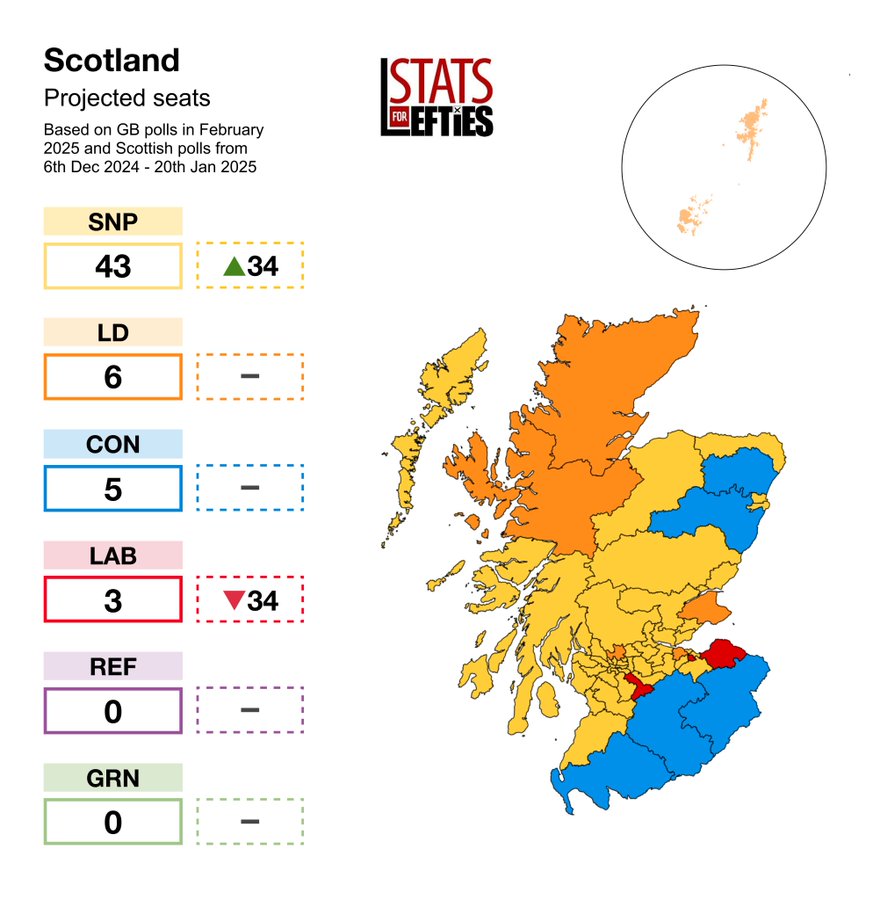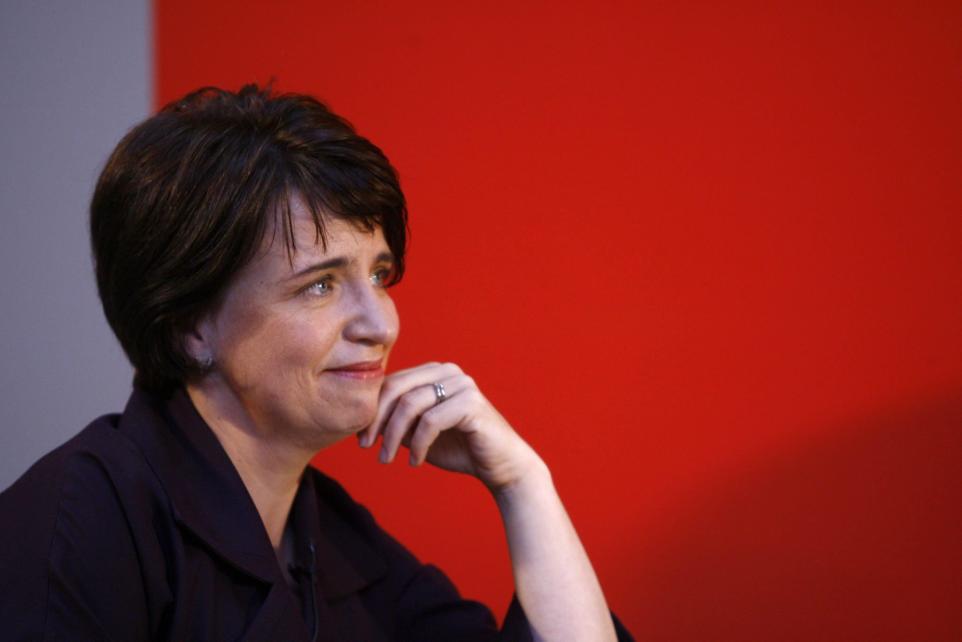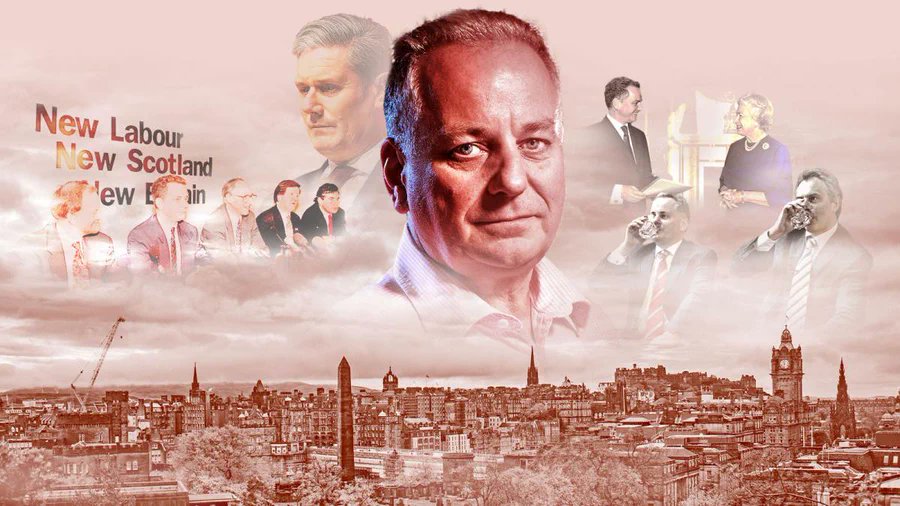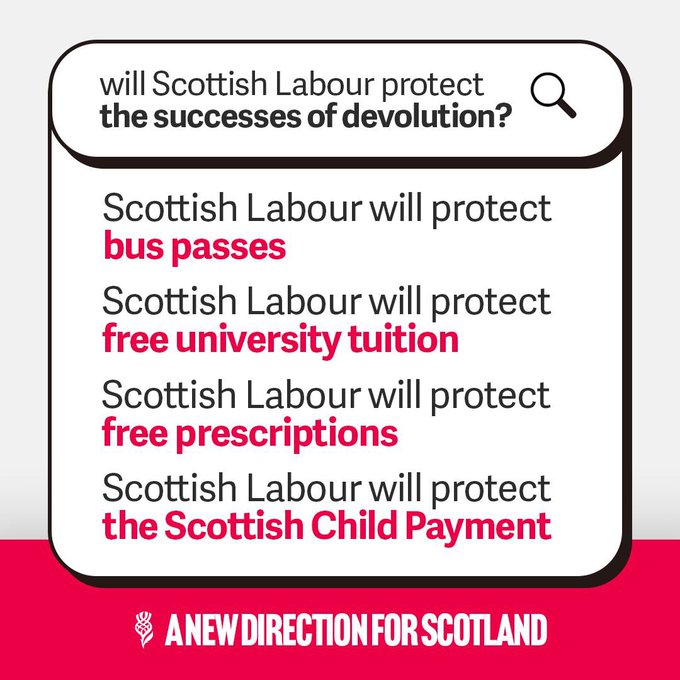The Hauntology of Scottish Labour
A Fifty Year Speech Defect
I am listening to Frances Barber talk about her role in the new play When Maggie Met Larrie, about the time when a younger Margaret Thatcher met Laurence Olivier to help her with speech training. Can we already detect the class cringe of the aspirational future leader, whose grating voice would irritate an entire generation? It was of course this week the 50th anniversary of Thatcher’s ascendancy to become the leader of the Conservative Party and the cataclysmic events that ensued. So many broken communities, so much untold poverty. Although she was Prime Minister from 1979 to 1990 and Leader of the Conservative Party from 1975 to 1990, her politics were never buried.
This week we learned that Keir Starmer had also had speech training. Not that these two politicians are more than superficially alike. Yes, in the week that Grenfell Tower was dismantled and we had more fervent edicts for yet more ‘deregulation’ it’s easy to see this as the interminable long 1980s. Yes it’s convenient to see Starmer as the Heir to Blair and to see ideological continuity over the past fifty years, but there are real differences between our rulers then and now. Margaret Thatcher was a conviction politician, whatever you thought of her, but we now live in an era of no-conviction politics and no-conviction politicians.

People used to say we get the politicians we deserve. In this respect, the current crop at No 10 is suited to what Sarah Kenzidor has called the ‘No Information Voter’. Aimless politicians, un-anchored to any serious or substantial set of values, float around looking for something to attach themselves to: scapegoats; minorities; refugees or other targets are landed on, and voters, raging but also un-anchored are guided to the voting booth.
Fifty years ago, when Margaret Thatcher became leader of the Conservative Party, we thought the worst that could happen was the Prime Ministership of Maggie and the daft dawdling Presidency of Ronnie the Ray Gun, captured by Spitting Image who sold squeaky dog toys of their effigies. How naive we were to think this was the nadir. How stupid we were to think that this was the end-game.

Now we are faced with the great alternative not of Callaghan or Foot or Smith or Kinnock but Keir Starmer, and not with the ‘Special Relationship’ hosted by Reagan and George Bush and Clinton and Dubya and Obama but Donald Trump and Pete Hegseth and Tulssi Gabard. Now we are faced with JD Vance lecturing us on democracy.
The post-Thatcher settlement for Scotland ended (or was supposed to end) with some semblance of constitutional change to heal the wound of her time in office.
Devolution was credited as the solution to the endless democratic deficit of Scotland voting Labour and getting Tory (that was in the era when the difference was discernible). This was the era when the fabled ‘Feeble Fifty’ were Labour, not SNP, and Labour’s plans for devolution merged from the scars of that process.
But the plans for a settlement that would evolve with time have stalled, at the same time as Margaret’s ideology has been disinterred. It was the Secretary of State for Wales, Ron Davies who memorably referred to devolution as “a process, not an event” and not Donald Dewar as is frequently misattributed. But that idea of “process” seems to be at at an end.
Labour, now tanking north and south of the border in extraordinary polling has shown little signs of delivering the changes that were promised after the independence referendum when Gordon Brown famously announced that a No vote would mean “We’re going to be, within a year or two, as close to a federal state as you can be.”
The idea that Labour could deliver social change, and survive and thrive north and south of the border with a reforming agenda lies in ruin with Keir Starmer, who looks increasingly like a busted flush for the Union. As we look on at Thatcher’s dark anniversary it seems like 1979-1990 was the era of foreshadowing. Labour’s policies are a shadow of their former selves, and electorally they look highly vulnerable to a Reform UK which makes the Thatcher era look mild by contrast. If poll after poll were to be confirmed next year at the Holyrood elections, Scottish Labour would be eviscerated and the celebrations – and expectations – that ran high last year will have come to naught.

Labour, as Macdiarmid once had, “Went up like a rocket and came down like a stick”. Whether it was as a tool to “get rid of the Tories”, or as a last gasp of belief in Labour’s reforming agenda, support for Labour seems to be collapsing. This may mark the end of an era – an era under which Labour were associated with constitutional reform, even though, technically, formally, Scottish Labour still lays claim to being an agent of change. Under the section marked “Where We Stand” the Scottish Labour Party’s website has a section called “Constitutional Reform”. Here they state: “Labour want to see Scotland strengthened as part of a modern and changed United Kingdom. The next Labour Government will transform the UK with the biggest transfer of power out of Westminster and deliver economic, democratic and social renewal across the nations and regions.”
They go on to claim: “Labour will clean up Westminster, abolish the outdated and discredited House of Lords and replace it with an elected second chamber. This new chamber will have representation from across the nations and regions, including Scotland, and a specific role in protecting the devolution settlement.”
Digging deeper you even find a document referring to “principles” including that the “Scottish people are sovereign and have the right to determine the best form of government suited to our needs” and that “the UK should be a union of equal nations.”
These constitutional fragments are like rare-earth metals or scrolls from a distant path given the messaging and stories put out by Labour in recent years, and actions speak louder than words.
Lords, Ghosts and Barons
This week we saw Wendy Alexander elevated to the House of Lords. Alexander, whose brother Douglas Alexander is currently the UK’s trade policy minister, was an MSP from 1999-2011 and led Scottish Labour for a nine-month spell between September 2007 and June 2008, but resigned after breaking rules on declaring donations. Ms Alexander was officially introduced to the second chamber as a legislator on Thursday morning, swearing allegiance to King Charles III. She will now be entitled to sit in the House of Lords for life as Baroness Alexander of Cleveden.
Many suspect she will be appointed to Sir Keir Starmer’s government, but her elevation to the Lords feels like further sign that Labour’s commitment to “abolish the outdated and discredited House of Lords” is not just a cynical lie but the highest form of hypocrisy. Not only that, but Alexander’s appointment comes in the wake of the disastrous financial mishandling of Dundee University, which she was International Vice Principal of up until only a few months ago. As the £30 million black hole in Dundee University’s finances was revealed, Alexander side-stepped her role to take up a senior role with the British Council.

The return of the Alexander’s feels like a throwback, and a betrayal to all of the promises for reform that Labour have made, and still, at least formally, make. Labour has the tone and feel of a government at the end of long years in office, even when they have just arrived.
This was foretold. back in 2023 The Times heralded the re-emergence of Wendy’s former colleague, Jack McConnell. The newspaper breathed triumphantly: “After more than a decade out of government, Jack McConnell is being touted for a return to the corridors of power as Sir Keir Starmer and the team around him start to map the structure of a future Labour administration at Westminster.”
In a memorable graphic great figures from the great past are in collage. Floating above the clouds of Edinburgh are Keir Starmer and McConnell, with the Queen and. under the titles ‘New Labour New Scotland New Britain’ (with the latter mostly obscured) are the figures of McConnell flanked by Robin Cook, Donald Dewar, Gordon Brown and George Robertson. To the right of the picture McConnell and Tony Blair are shown drinking (possibly Kool-Aid).

‘Jack’s back’ thundered The Times, but why, and to do what?
It’s no just that – in the immortal words of Logan Roy ‘these are not serious people’ – it’s that they have no political project. The reason ‘New Labour New Scotland New Britain’ are floating free, pale and indistinct is that none of them have any meaning any more, nor do any of the individuals have anything to say about them.
Now Jack, triumphant in return, is joined by Wendy and her brother Douglas. But these are like ghosts from banquet’s past. These are like re-treads of the 1990s, phantoms of Labour’s reforming period, where ‘Change’ meant more than recycling Conservative immigration policy. What would Labour’s newly-elevated Baroness say about democracy or sovereignty?
The problem for Starmer’s newly restored Scottish Baron’s is not just the obvious hypocrisy of the perpetually-expanding House of Lords and the Never Ending Story of its imminent reform. The problem is also how do the Baron’s tell a story of a new Scotland, when they themselves represent an era which is long past?
The Scotland of the late 1990s has gone and the ties and networks that sustained it have morphed into new bodies that attract themselves to new sources of power. Labour is then – as Alexander’s elevation shows – still institutionally connected through the British establishment, but it is electorally detached – and, if the polls are correct will become even more so. We are entering a situation where Labour run the risk of being elevated to a chamber they pretend they are abolishing while they are being rejected at the ballot box.
Showing Your Cards
Labour’s election into government in London was supposed to precis a return of favour in Scotland. The two were supposed to be tightly inter-connected and endless editorial ink was spilt championing the incoming return to the natural order of things.
The ink’s run dry and the triumphant editorials are quieter now. The writers’s though, still in place, of course, say little about the huge changes that were coming down the track, the constitutional reform that was just around the corner, the democratisation that was coming still. All is Quiet.
The silence is echoed too from their colleagues on the SNP front-line, who, despite improbably riding high in the opinion polls also have little to say about the way forward to resolve the constitutional impasse. Scottish Labour this week were ridiculed for issuing a promise card that looked remarkably low in aspiration. Going into the 2026 elections it looked like Labour were ‘promising to protect bus passes’.

If Labour’s commitment to uphold the basic gains of Devolution (made under SNP and Labour government’s) seemed liked small beer, it also seemed like an odd commitment. Why do you have to promise that you won’t abolish the most basic social democratic achievements of Holyrood? What is this?
These promises have the same tenor and feel of Anas Sarwar’s promise to ‘protect Scotland from Keir Starmer’, it has the feel of an odd protection racket from a threat that is supposed to be your ally. Not only does this sit very oddly but the buried gem that Labour believe that “the UK should be a union of equal nations” seems an absurdity in light of the endless attacks on devolution and the perpetual sidelining of Sarwar within his own party and government.
None of this seems real, none of this seems credible. Perhaps both parties, with much more in common than they would admit have settled to this. This is the culmination of devolution after a quarter of a century, a consensus that we should have bus passes, and free prescription and free tuition fees and try to offset the worst poverty that late-capitalism and late-Britain rains down on us.
Nothing systematic is up for grabs. You’ll get a pass through the unregulated traffic mayhem, higher education will continue to be commodified, but Scots will get a pass, health will continue to be privatised but Scots will get free prescriptions, and endemic poverty will continue but we’ll offset the worst of it.
It’s better than Westminster, but nothing will really change. If that was the slogan, would you vote for it?
That seems like a modest, low-bar for Scotland, and the worst idea that would happen, that is already being stitched-up in certain quarters, is a sort of alliance of mediocrity, bringing Labour and the SNP together.
Although such an idea is an anathema to many, it is already being whispered about in dark corners, as a putative defence against Reform UK encroachment, and the rise of the far-right. Such a response would be a disastrous one, pitting a lowest common denominator of centrists against an insurgent right. But it is interesting that those I have heard suggest this all come from the Labour fold, or are ex Conservative lobbyists.
This is a desperate plea being dressed-up as a way to save the country from Reform. But the evidence on current polling shows Reform making little incursion into Scotland, with Labour and the Conservatives in freefall.
This may change but it will only be resisted if the alternatives are real. Back in January Neil Mackay wrote (‘The Union is on borrowed time: Yes camp must prepare for indy‘): “As to the vision for independence: embrace the pain; be honest. Voters no longer believe platitudes. They want plain-speaking and emotion. Admit that independence will not be easy, but could it really ever be worse than what’s being done to the country by London? That’s the only authentic message. Most of all: be radical. Independence will only succeed if it offers real social change.”
This remains true today. In order to resist the threat of Reform there needs to be a counterpoint which is also about real change and disruption. The way to commemorate Thatcher is to create a society – yes a society – that stands against all of the values she represented. Let’s make the 50th anniversary everything she would hate, a new Scottish politics based on common ownership, collective organising and self-determination. A Scotland with an Accent of the Mind that would move beyond the stale party politics of manageralism and move beyond the current stalemate. 2026 offers a possibility for not new politicians but new politics that moves us beyond the limitations of Broken Britain.

Great article highlighting the utter absurdity and contradiction of what Labour and it’s Scottish Branch Office expect us to swallow. Thanks.
Is this a typo? ” Who do you have to promise that you won’t abolish the most basic social democratic achievements of Holyrood?”
Should the first word be “Why” ?
Ah, yes, corrected now. In my head was a sentence “Who needs to promise” while on my keyboard another sentence was forming … sorry/thanks!
Well said
Unless Labour (& Tories) in Scotland become completely separate parties from UK parties they are doomed to fail. They currently take responsibility for unpopular incumbent Westminster government policies and then twist themselves in knots by simultaneously attempting to distance themselves from these policies while supporting government implementing them.
Labour has been going downhill in Scotland since 1997 because they thought Devolution was the destination not an ongoing process. This mindset is founded in the belief of many in Labour Party that devolution was not implemented to primarily improve democracy and life in Scotland but as a tactic to head off SNP and support for independence.
It’s not the presence of speech training for our politicians that concerns me, it’s the complete absence of number training for any of them. This deficit seems to be evenly shared among the parties. On the plus side, it’s one thing in which unionists and nationalists can find common ground.
As for conviction politics, I am not a fan. I’d rather not be led by those who know the answer before they’ve considered the case and won’t be swayed by the evidence. At the moment, unfortunately, it’s convicted politicians who are leading the world.
I would like people to believe in the things they say, even when I disagree with them
Oh, I agree but resolving to tell the truth is not the same as being convinced that you always know the truth. A lot of damage was done by British governments who “knew” that the economy would be better off if everything was nationalised and then other governments who “knew” it would be better off if everything was privatised. If, as you hope, Scotland becomes fully independent, I hope we can be saved from governments who know the solution to everything and instead can benefit from those learn, try to understand and re-learn if things don’t work. Let’s have some Popperian piecemeal engineering https://www.oxfordreference.com/display/10.1093/oi/authority.20110803100326471 . After all, engineering pragmatism has hardy been a quality in which Scots have been laggards, politicians excepted.
Yes there’s a reason the phrase “dead certainty” exists. Admitting “not knowing” is important and especially in such a radically uncertain world. I suppose I mean that I’d like people not to be lying to us, and themselves when they speak.
It must be very weird running Scottish Labour. Almost every initiative that Sarwar launches immediately becomes grounded on the rocks of his own (and Scotland’s) lack of autonomy and meaningful agency.
His own party is a living demonstration of why devolution, as a gift from a superior body, can never produce a fully-functioning nation. He literally makes the case for Scottish independence every time he tries to do something worthwhile. It is deeply comedic and ironic.
I wonder if he is aware of this?
Of course Sarwar is aware of his position and lack of credibility. He is there to stop anyone who has the merest smidgin of a transformative policy from being in a position in the party where she or he can propose it. Labour in Scotland exists to oppose anything constructive proposed in the Scottish Parliament or in Council chambers. It is there to decry anything Scottish. It is a party with few active members and few of them have any powers. They are there to make money for each other.
And does Monica Lennon have the courage and backing to make a move? I rather think not.
not sure this standard demonisation of thatcher is going to get you very far, if you’re talking about an agent of change she certainly was that, and it would have to be acknowledged that some of the heavy industry, mining, steel works and so on was a hellish way of life for those who had no option but to go do that, same as their father, their father’s father, and so on. Seems to me tho that the main industry of these islands for long enough has been the export of violence, I am wondering why anyone would bother themselves fretting over those that get up in the morning and stick on the suit or sunday school frock as though they were away to their first day at the uni all over again, these ‘people’ if we can call those that seem to have no conscience people are simply not worth a second of your thought nevermind your vote, slainte
I didn’t have you down as a Thatcherite, but no doubt that heavy industry, particularly mining was a harsh and hard job of work. What a contrast to today’s work in the gig economy with its precariousness or the soul-lessness of call centres, data centres or remote working, a different kind of exploitation for sure.
Indeed yes, for the record I have never voted tory ever, I think we have a new set of strains on the workforce, possibly more psychological torture by the powers that be than ever before, I would be interested if folk could maybe have a think about why they first voted, would it be the case they were pressured into voting by parents, the education system, constant propaganda received from various media? Political debate I suppose is always interesting, so long as you don’t take it too seriously, otherwise you’re liable to be constantly disappointed, dejected & depressed which I believe the cynical political class in these islands are banking on, anyhoo, quite proud that I have not voted for any of them in 9 years now, it is a difficult habit to break, but when one has been clear of the voting for a few years one may well find they take greater pleasure in the simpler things in life, all the best now, Mark
Yes, I agree that Thatcher was an ‘agent of change’ and a very successful one she was, too. Self-proclaimed ‘progressive’ parties have not been able to create a convincing alternative narrative, despite there having been from people like Stuart Hall rigorous analyses of ‘Thatcherism’ and why it appealed to many people who had not voted Tory and, who, in many cases suffered as a result of her policies.
As you indicate, conditions in heavy industry for workers (and their families) were generally bad, indeed, often life-shortening. Trade unions had many members, but with the help of mendacious media, Mrs Thatcher was able to portray them as luddite and resistant to change. She forced them into a situation where they were seen to be defending things that were not in the interests of the membership. Arthur Scargill, by his actions proved, to many, her arguments.
By the time Blair and Brown came along they had accepted the Thatcherite hegemony and their ambitions were to make it a bit nicer for people, without seeking to change the hegemony and the structures of power. By rescuing the banks (‘saving the world’, in Brown’s egotistical self-delusion he and Darling provided ‘socialism for the rich and powerful’ rather than ‘seizing the time’ to redistribute power and wealth.
Starmer and Reeves are the heirs of Blair and Brown, but without the charisma, the articulacy, the political skills and an inability to tell a convincing story. They speak in cliches and offer no hope. In Liz Kendal, they have a work and Pensions Secretary who seems to loathe people because they are poor and have not had the ability to be able to live in a £4 million pound house like she does.
Their slogan at the election ‘Change’, was vacuous and it could easily be reversed Orwellianly to ‘No Change’.
Very well put, although I always failed to see the supposed charisma of Blair & Brown, overgrown spoilt undergrads in my humble opinion. Would it be too controversial to posit the theory that Nicola S. or Nippy as affectionately known to many was in many ways the Scottish Thatcher? I wonder if anyone has any thoughts on Moray council’s recent statement that it shall not be the first of Scotland’s local authorities to go bankrupt thanks in part to their intention to hike another 9% onto folks’ council tax bill. At least if we are to believe what is written in the Highland News & Media propaganda sheet coming straight to you courtesy of a couple of press moguls based in Southampton. I am reminded of a song, ‘Is it worth the aggravation . . . etcetera, all best, Mark.
Have you heard of Salvo and Liberation.scot This is the new front line
aye, interesting stuff, I applaud the effort but wonder if it’s getting us any further forward, also wonder about what folk believe is progress, I had a blether earlier on with a pal of mine who was telling me he caught a grand total of 30 mackerel last year, apparently there are also bluefin tuna in the north sea now gobbling up the young fishes, this would indicate a rise in sea temperature if true since I’ve never known there to be tuna going about in our waters, December at least up here was an absolute write off weatherwise, pretty much a month long storm, the question I’d be most interested in is whether the weather is indeed becoming more extreme as a result of human intervention or is it the case that nobody is getting any younger therefore we tend to feel it more as we get older, I suspect the former to be the case and have little faith in humanity to overcome its tendency towards ego driven selfishness & short term thinking, perhaps it is the case that each person needs to take individual responsibility & tell the rest of the population tae git tae fk 🙂 all the best now, Mark.
“Let’s make the 50th anniversary everything she would hate, a new Scottish politics based on common ownership, collective organising and self-determination. A Scotland with an Accent of the Mind that would move beyond the stale party politics of manageralism and move beyond the current stalemate. 2026 offers a possibility for not new politicians but new politics that moves us beyond the limitations of Broken Britain.”
No. We don’t need “a new politics” or “an accent of the mind”.
What we in Scotland need is a plan to restore our nation-state status. That is, a path that leads us step by step from where we are now and finishes at the stage where the Union is ended. Those parties advocating for Independence need to adopt that common process in their manifestos at election time.
Then it becomes real for people and grabs their attention.
Until then it’s just words, a means to garner votes for bench-warming purposes.
hmm, ahd nivir heard this phrase ‘accent ae the mind’ wid it be permissible ae me tae type in the accent that is in ma heid or am ah likely tae be scolded oan these virri pages fur no typin in the anglaise
It’s just a phrase. Trying to remember where I heard it. Sorry it’s offended people somehow
hasn’t offended me at all, I did a wee google search and it landed me in Rab Wilson’s direction, which was no bad thing
WE do need a plan to restore our nation-state status Duncanio I agree. But I also think we need a new politics A > B.
If you want to engage people give them something they can actually relate to and focus on.
A plan for restoring Scotland’s full self-government achieves that.
Ordinary folk People aren’t interested in a “new politics”. It’s too nebulous. Only the chattering classes deem it relevant.
I think people are allowed to think.
That’s a glib comment
‘In order to resist Reform, there needs to be a counterpoint which is also about real change and disruption.’
The electoral evidence of the last decade in Scotland is that this ‘counterpoint’ simply does not exist. There is, to all intents and puroposes, no party of the left seeking power, even at Holyrood – where proportional representation can give parties with a few MSPs disproportionate influence.
That is true, Florian Albert. But it’s not just about party politics, but also about a broader social movement within civil society that might challenge the current stasis.
Across Europe and North America, what are loosely termed ‘populists’ have risen to prominence in the past decade. They have done this by success in elections; not via street politics. Electoral success gives them legitimacy. ‘Broader social movements’ simply do not confer political legitimacy in the way electoral success does. In a democracy, the failure to participate in elections is a demonstration of weakness.